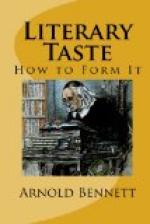How (you ask, unwillingly) can a man perform a mental stocktaking? How can he put a value on what he gets from books? How can he effectively test, in cold blood, whether he is receiving from literature all that literature has to give him?
The test is not so vague, nor so difficult, as might appear.
If a man is not thrilled by intimate contact with nature: with the sun, with the earth, which is his origin and the arouser of his acutest emotions—
If he is not troubled by the sight of beauty in many forms—
If he is devoid of curiosity concerning his fellow-men and his fellow-animals—
If he does not have glimpses of the nuity of all things in an orderly progress—
If he is chronically “querulous, dejected, and envious”—
If he is pessimistic—
If he is of those who talk about “this age of shams,” “this age without ideals,” “this hysterical age,” and this heaven-knows-what-age—
Then that man, though he reads undisputed classics for twenty hours a day, though he has a memory of steel, though he rivals Porson in scholarship and Sainte Beuve in judgment, is not receiving from literature what literature has to give. Indeed, he is chiefly wasting his time. Unless he can read differently, it were better for him if he sold all his books, gave to the poor, and played croquet. He fails because he has not assimilated into his existence the vital essences which genius put into the books that have merely passed before his eyes; because genius has offered him faith, courage, vision, noble passion, curiosity, love, a thirst for beauty, and he has not taken the gift; because genius has offered him the chance of living fully, and he is only half alive, for it is only in the stress of fine ideas and emotions that a man may be truly said to live. This is not a moral invention, but a simple fact, which will be attested by all who know what that stress is.
What! You talk learnedly about Shakespeare’s sonnets! Have you heard Shakespeare’s terrific shout:
Full many a glorious morning have I seen
Flatter the mountain-tops with sovereign
eye,
Kissing with golden face the meadows green,
Gilding pale streams with heavenly alchemy.
And yet, can you see the sun over the viaduct at Loughborough Junction of a morning, and catch its rays in the Thames off Dewar’s whisky monument, and not shake with the joy of life? If so, you and Shakespeare are not yet in communication. What! You pride yourself on your beautiful edition of Casaubon’s translation of Marcus Aurelius, and you savour the cadences of the famous:




